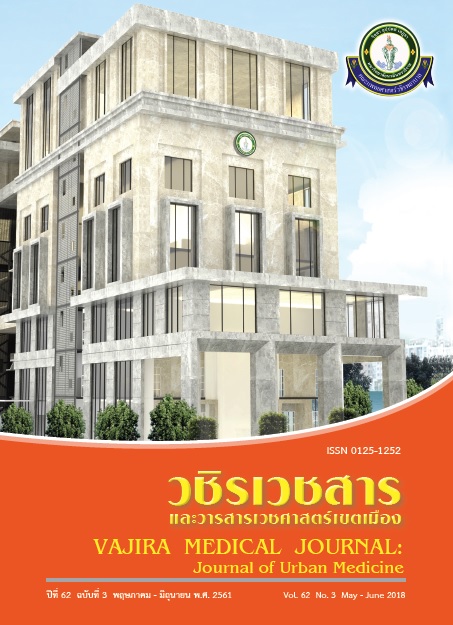A Structural Equation Model of Sustainable Hospital Accreditation in the Ministry of Public Health
Main Article Content
Abstract
Objectives: To study factors and develop an equation model of development and accreditation of hospitals under Permanent Secretary, Ministry of Public Health.
Methods: Data were collected by interviewing 24 hospital directors and key quality coordinators in 12 accredited hospitals. The data were analyzed using content analysis and was given back to 625 representatives to ask their opinions using questionnaires under random sampling. Indexes of Item-objective Congruency were 0.6–1.0 and Cronbach’s alpha coefficient was 0.95. The data were then analyzed using Second order Factors Analysis of Structural Equation Modeling (SEM).
Results: The study showed 9 impact factors influencing development and accreditation of hospitals under the Permanent Secretary, Ministry of Public Health. These included leaders, workforce, surveyors, development and learning, work systems, Hospital Accreditation Institute (Public Organization), customers, Ministry of Public Health and HA standard criteria. After analysis using Second order Factors Analysis of SEM was performed, the 9 factors which influenced hospital accreditation from the most to the least important were as follows: 1) workforces (β=0.882) , 2) work systems (β=0.873) , 3) development and learning (β=0.842) , 4) customers (β=0.814) , 5) Hospital Accreditation Institute (Public Organization) (β=0.777) , 6) HA standard criteria (β=0.724) , 7) leaders (β=0.700) , 8) surveyors (β=0.626) , and 9) Ministry of Public Health (β=0.622) .
Conclusions: The three most important factors affecting the development and accreditation of hospitals were workforce, work systems, and development and learning, There are, however, other related factors supporting quality and development in organizational contexts to sustain successes.
Downloads
Article Details
References
2. Supachutikul A. HA update 2014. Bangkok: Bangkok: Donebook; 2014.
3. Office of Policy and Strategy Ministry of Public Health. [Internet]. Bangkok: General information of the hospital 2016. [internet]. 2016. [cited 2016 Sep 1]. Available from: http://bps.ops.moph.go.th/Healthinformation/index.htm.
4. Healthcare Accreditation Institute (Public Organization). 2016. Interpersonal communication [e-mail], 15 October 2016
5. Sangkaew T. Social cience research. 2nd ed. Bangkok: Funny Publishing; 1997.
6. Tirakanant S. Instrumental of factory measurement social science research: Implications for practice. Bangkok: Chulalongkorn University Printing House; 2008.
7. Srisuk K. Research methodology. Chiang Mai:Khlong Chang Printing House; 2009.
8. Berdie DR, Anderson JF, Niebuhr MA. Questionnaires: design and use. Metuchen, N.J.:Scarecrow Press; 1986.
9. Bentler PM, Chou CP. Practical issues in structural modeling. Sociological Methods & Research. 1988;16:78-117.
10. Joreskog KG. Sorbom D. Lisrel 8: User's reference guide. Chicago: Scientific Software International; 1996
11. Kline RB. Principles and Practice of Structural Equation Modeling. New York: The Guilford Press; 1998
12. The Institute of Hospital Quality Improvement & Accreditation. Healthcare Organization Accreditation Standards For the 60th Anniversary Celebration of His Majesty’s Accession to the Throne. Bangkok: Donebook; 2008.
13. Tangkittipaporn J. Organizational diagnosis for excellent. Bangkok: Chulalongkorn University Printing House; 2010.
14. Moongtaweekait W. A factor of successful process in development and support of hospital quality. Case study: Neurological institute Bangkok. [dissertation]. Bangkok: National Institute of Development Administration; 2004.
15. Goetsch DL, Davis SB. Quality management introduction to total quality management for production, processing and service. 3rded. New Jersey: Prentice Hall Inc; 2000.
16. Navakasorn R. Organization management by applying the HA guidelines in Private Hospitals: A case Study: Bangkok Hospital Trat. [dissertation]. Bangkok: National Institute of Development Administration; 2007.
17. Chimchalong R. The nursing service quality development in an accredited tertiary hospital. [dissertation]. Bangkok: Chulalongkorn University;2008.
18. Juran JM. Juran of leadership for quality. New York: Free Press; 1989.
19. Songsangchan C. The analysis of factors affected on development of personnel participation for hospital accreditation of thatakeab hospital chacheongsao province. [dissertation]. Bangkok: Rajabhat Rajanagarindra University; 2006.
20. Ratcliffe RL. Re-engineering hospital accreditation. Clin Governance. 2009;4:315-35.
21. Supanun W. Factor contributive to success of hospital in quality development and accredited: A case study of the lopburi hospital, lopburi province. [dissertation]. Bangkok: National Institute of Development Administration; 2002.
22. Youpensuk U. Nursing service quality improvement process: A case study of health promoting hospital [dissertation]. Bangkok:Chulalongkorn University; 2006.
23. Netprapha S. Developing the strategic quality management model in private hospital. [dissertation]. Bangkok. Suan Dusit Rajabhat University; 2009.
24. Rujimora T. The strategy of quality management system implementation in public sector organizations : A case study of hospital accreditation (HA) implementation in pranangklao hospital. [dissertation]. Bangkok. Suan Dusit Rajabhat University; 2010.
25. Lau HC, Idris MA. The soft foundation of the critical success factors on tqm implementation in malaysia. The TQM Magazine. 2001;13: 51-60.
26. Kotter JP. Leading Change Why Transformation Efforts Fail. 2007. [internet] 2007. [cited 2018 February 10] Available from: https://hbr.org/2007/01/leading-change-why-transformationefforts-fail.
27. Healthcare accreditation institute (Public Organization). Surveyor handbook 2016. [internet]. 2016 [cited 2016 April 1].
28. Davis MV, Cannon M, Stone DO, Wood BW, Reed J, Baker E. Informing the national public health accreditation movement: Lessons from North Carolina’s accredited local health departments. Am J Public Health. 2011;101 (9) :1543-8


